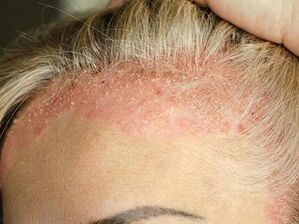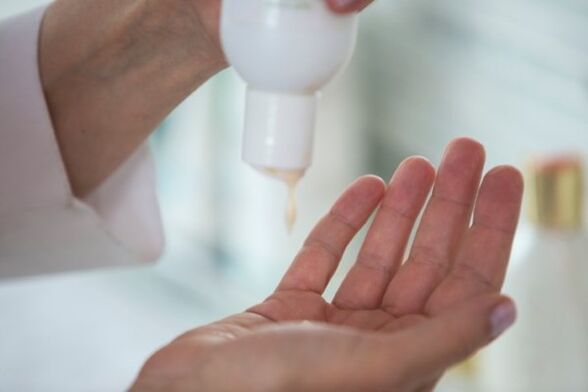Psoriasis or scaly lichen is a recurrent skin disease. It affects all parts of the body. Scalp psoriasis is very common. The exacerbation of the disease is accompanied by symptoms such as itching, red rash and extensive skin peeling.
Reasons for development
The pathogen and development mechanism of scaly lichen are scientifically unknown. It is speculated that the pathology is related to immunocompromised. Because psoriasis is more common in people whose relatives have this disease, the researchers did not rule out genetic links.
Scaly lichens can be caused by:
- Viral and bacterial infections;
- Allergic reactions;
- Endocrine system diseases;
- Pathology of the digestive system;
- Disorders of metabolic processes.
The reasons for worsening scalp psoriasis may be the following reasons:
- Severe or chronic stress;
- Drink coffee, chocolate, cakes and pastries;
- Bad habits-alcoholism and smoking;
- Mechanical damage to the skin;
- Low temperature;
- Take non-steroidal drugs, β-blockers, and lithium preparations.
In most patients, hair psoriasis is caused by multiple factors, so doctors consider it to be a multi-cause disease.
diagnosis

Dermatologists participated in the identification of scaly lichens. The initial stage of psoriasis can be determined by visual inspection.
The main method of diagnosing psoriasis is considered to be scratching from the damaged area while using a glass slide, and analyzing the existing sign-the phenomenon, psoriasis, which is called the psoriasis triad.
A characteristic symptom of the disease is the psoriasis triad-the presence of spotting hemorrhages, stearic plaques, and end membranes.
In advanced cases, scalp psoriasis may be confused with other skin diseases.
In order to confirm the diagnosis, it is necessary to perform a skin biopsy and donate blood for analysis.
treatment
For psoriasis to achieve stable remission, comprehensive treatment is required. This includes: the use of medicines, special cosmetics, physical therapy, visits to health resorts, folk remedies and other activities.
drug
There are a variety of topical and systemic drugs available to treat scalp psoriasis. The choice of medication depends on the stage of the disease and the personal preferences of the patient and doctor.
Use topical drugs to treat mild to moderate psoriasis. The advantage of topical treatment is that it has fewer side effects. In severe cases, dermatologists will use more toxic offensive drugs, including systemic drugs.
Local therapy use:
- Birch tar
- Salicylic acid ointment;
- Idol ointment;
- Preparations containing panthenol;
- Antihistamines;
- Glucocorticoids;
- Vitamin D analogues;
- Dithranol;
- Closed dressing with medicine;
- Retinoid
- Calcineurin inhibitors;
- Emollients.
Complexes of systemic therapy may include:
- Antihistamines;
- Anti-inflammatory non-steroidal drugs;
- Retinoid
- Calcineurin inhibitor with immunosuppressive effect;
- Non-specific immunomodulators.
In cases where other methods of treating scalp psoriasis have failed, it is recommended to take cytostatic and corticosteroid drugs. If the skin is infected, and the symptoms of the accompanying disease, the doctor may prescribe antibiotics. The treatment of psoriasis is usually accompanied by the use of intestinal absorbers, sedatives and vitamins.
Systemic drug release forms: injections, powders, tablets, oral drops, sprays or syrups.
Medical cosmetics

You can find effective ways to treat scalp psoriasis with special cosmetics.
The most popular is medicated shampoo. They gently and without side effects, clean the affected skin from the keratinous scales, soften it, reduce inflammation, and eliminate itching.
Patients with psoriasis should decide which shampoo to use based on the effect of shampoo. They must have the full effect of eliminating pain and restoring the covering.
Based on a set of measures with individual tools, you can determine the appropriateness of its use or prioritize more effective shampoos.
Psoriasis shampoos can be divided into several condition groups.
Zinc pyrithione
Active zinc pyrithione is effective against harmful bacteria-Streptococcus and Staphylococcus, as well as certain types of fungi.
Contains tar
The shampoo contains refined birch, pine, juniper or willow tar. It has a corneal shaping effect, can prevent excessive cell proliferation, and can be used as an antiseptic.
Ketoconazole
Some medicines contain ketoconazole, an antifungal agent. Although the instructions did not mention psoriasis, many patients noticed positive effects after washing their hair with shampoo containing this substance.
In addition to the above ingredients, medicinal hairdressing cosmetics may also contain: urea, salicylic acid, ichthyol, selenium sulfide, clomezole, ciclopirox and other ingredients. You can't continue washing your hair with this shampoo-the treatment process is prescribed.
Physiotherapy procedures
Physical therapy is an integral part of the comprehensive treatment of scalp psoriasis. It is prescribed during the disappearance of clinical symptoms and the onset of relief. There are several ways to improve the patient's condition.
Cryotherapy
Cryotherapy-Exposing the skin to ultra-low temperatures (from -140 to -160 °C). Organs and tissues are under pressure, trigger a series of biochemical reactions, and regulate various processes including autoimmunity. Under the action of liquid nitrogen, cell regeneration is enhanced, scaly formation is blocked, and psoriasis plaque disappears.
Contraindications: visceral vascular disease, exacerbation of chronic diseases, fear of cold, claustrophobia.
Phototherapy
Phototherapy-Spectral irradiation of psoriasis plaques with ultraviolet light. This program has immunomodulatory and anti-inflammatory effects, and reduces the rate of cell division. There are several types of light therapy:
- Photochemotherapy (PUVA);
- Selective phototherapy;
- Laser exposure.
They are all effective for treating scalp psoriasis. A concentrated beam of light is absorbed by cells with high fungal activity, leading to their destruction and death.
Contraindications: diabetes, tuberculosis, persistent hypertension, poor blood coagulation, tumors, epilepsy, pregnancy, keloids, viral diseases, kidney disease, the sixth skin light type.
Spa treatments

After 2-3 months of medication, it is recommended to continue the treatment of psoriasis in a nursing home. It is important to know that you cannot visit health resorts during the worsening of the disease: the return phase should come.
Hydrotherapy treatments can include:
- Sunbathing-sunbathing.
- Air therapy-stay in clean air.
- Thalassotherapy-treatment with sea water.
- Balneotherapy-procedures using mineral water (alkaline water, hydrogen sulfide, bromine iodine, rose red, siliceous water).
- Peloid therapy-the effect of healing mud.
Many patients' conditions have improved after climate change. Staying at the beach or relaxing at the resort will help you forget the manifestations of psoriasis for a long time.
Folk remedies
Traditional medicine formulations can be used to treat and prevent scaly lichens. The advantage of natural ingredients is their relative safety to the body. To reduce the frequency of acute attacks, you can use the following methods:
- Mix 1 tablespoon. Lake baking soda 4 tablespoons. Rub the lake water into the scalp and rinse with warm water after it dries. The solution has a softening effect and relieves itching.
- Use a blender to grind the peeled ripe banana, apply the mixture to the area affected by the psoriasis, and then rub it into the skin. After 20 minutes, wash off the mask with warm water. Banana pulp can relieve inflammation and itching.
- Add 2-3 drops of tea tree oil to a part of the medicinal shampoo, apply to the hair, massage the scalp, and rinse off under the shower after 5 minutes. Regular use of oils with antiseptic properties can eliminate the symptoms of psoriasis.
- Dissolve sea salt in a little water, apply to the affected area, let it stand for 30-40 minutes, and then rinse off. This process can be repeated several times during the day.
- Mix equal proportions of salt with white or blue clay and add some apple cider vinegar-to get the consistency of sour cream. Lubricate the psoriasis plaque with the mixture, rub it gently, and let it sit for 2 hours.
Traditional recipes should not replace basic medical treatment. They play a supporting role and are used for complex treatments, rather than alone.
Prevention advice
With head psoriasis, you need to take good care of your skin. The brush should be soft, and the movements should be smooth and tidy when brushing the bristles. In this way, damage and infection of open wounds can be avoided.
Avoid using styling products, curling irons and hair straighteners. Do not use stains, because the chemicals can irritate the epidermis and cause the disease to worsen.
Just get rid of bad habits. Alcohol and smoking can negatively affect blood vessels, disrupt blood circulation, worsen skin nutrition and reduce the effectiveness of treatments.
The doctor recommends adjusting the diet to exclude bacon, chocolate, kimchi, white bread, tomatoes, spicy food, carbonated drinks, and espresso and tea.
It is important to avoid stress and maintain a healthy daily life. Adequate sleep is the key to good health, because this process triggers the self-repair mechanism.
Unfortunately, psoriasis cannot be completely cured because it is a chronic disease. However, with proper scalp care and following the above rules, you can reduce the number of relapses to a minimum.























